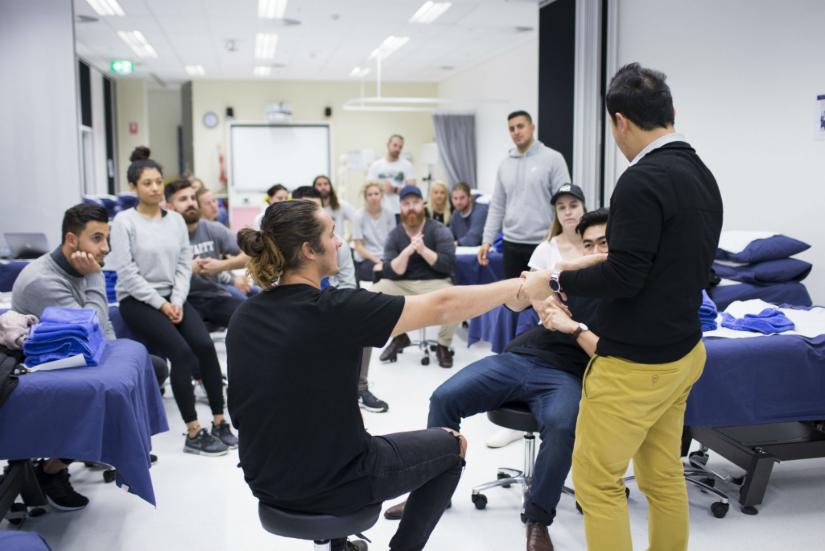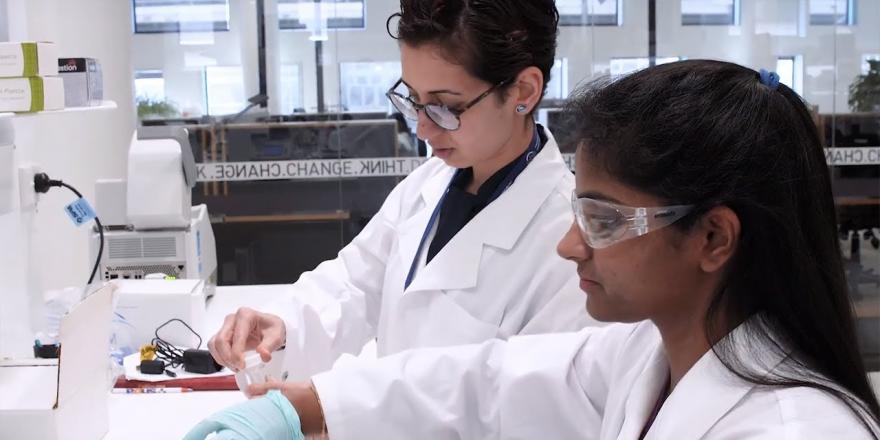Looking for a career with great job prospects? Do you love helping people? A career in health might just be for you.


Helping people is your thing!
People that choose a career in health are typically individuals you who are caring and enjoy helping people. Are you nurturing and supportive and get a nice warm feeling when you help someone? Then a career in health might be perfect for you. Regardless of the field of healthcare you choose to pursue, there are common attributes across healthcare. Communication and interpersonal skills are essential. Are you a people person? Physiotherapists, Pharmacists, Clinical Psychologists, and Orthoptists are in the business of helping people recover from illness or injury and manage chronic conditions. As a healthcare professional you will be helping people every day, so if you thrive on that warm fuzzy feeling when giving a helping hand, health might just be for you!
“As a clinical psychologist, in the future, I hope to provide the best service to individuals with an array of mental ailments. I hope they leave sessions feeling much better than when they came to me.” Rebecca Northowl – Clinical Psychologist Student

Great job prospects
Healthcare is something we all need. The Australian Government predicts that over the next five years to 2022, health care and social assistance will be Australia’s fastest growing industries – employing 1.5 million people. The increase in population, the National Disability Insurance Scheme and a nation with an ageing population on the rise is driving the need for more healthcare professionals. As a healthcare professional across Orthoptics, Physiotherapy, Psychology and Pharmacy, you will be in high demand and have excellent odds of getting a job.
“As an Orthoptist, in the future, I hope to have a secure and fulfilling job.” Cassandra Tan – Orthoptics student.

You will do work that interests you
Working in health provides you with career options that can lead you in many directions. You can take a research path and study medical conditions and medications, treat patients in an office or at a hospital; you can work in a professional role for a pharmaceutical company. You can diagnose eye conditions and provide therapy; the list is long! The range of skills and experiences is limited by your imagination.Working in health provides you with career options that can lead you in many directions. You can take a research path and study medical conditions and medications, treat patients in an office or at a hospital; you can work in a professional role for a pharmaceutical company. You can diagnose eye conditions and provide therapy; the list is long! The range of skills and experiences is limited by your imagination.

Cherie Lucas:
Broadly speaking, my research is about pharmacy education and interprofessional collaboration. I test strategies that enable students to derive to better clinical decisions through reflective practices. I certainly hope that this type of research enables students to be better practitioners, making better decisions for better clinical outcomes for the patients.
I use a number of different strategies, so the RACA, the Reflective Ability Clinical Assessment, but I also use the RIPE Model, which is the Reflective Interprofessional Education Model, and we use the medium and high fidelity mannequins and simulation in standardized patients. We've been putting this research into practice, we've published around this model of learning, and recently we actually received a university award for this model of learning, too.
Helen Benson:
My research is focused on the integration of pharmacists in general practice, which means when you go in to see your doctor, there's not only a nurse or a physio that you can see within the practice, but also a pharmacist. Pharmacists are really enjoying working within the general practice. It gives them a chance to use their skills and really show other healthcare professionals what they can do. The GPs have also loved having someone there to support them in helping patients understand their medications. I really hope that our research shows that having a pharmacist involved in a general practice team stops patients going to hospital because of drug related problems, helps them get the most out of their medicines, and really helps them control their disease states.
Mehra Haghi:
My research is on chronic airway inflammations as presented in asthma, chronic obstructive pulmonary disease and cystic fibrosis. There is currently no cure for these diseases and current anti-inflammatory formulations are insufficient.
We are currently working on a pre-clinical validation of a novel anti-inflammatory platform that we've developed. We can load it with different therapeutics, and these therapeutics are going to induce cells' own recycling mechanism to target inflammation. This is a paradigm shift. No other therapeutic on the market has taken this approach to resolve inflammation.
In patients with lung diseases like asthma and cystic fibrosis, when the patients gets to a stage that they become refractive and they do not respond to current corticosteroid therapies, then this new treatment would be another option that helps their body's own mechanism, recycling mechanism, to fight the inflammation and clear the inflammation.
Lisa Pont:
My research is looking at the safety and the quality of the way medicines are used in hospitals and nursing homes. I get medicine supply data from a pharmacy or an industry partner that has worked with nursing homes, and by looking at what's happening in the real world, we're able to identify problems, start to think about solutions, and change the way that medicines are used in facilities and in hospitals.
I'm passionate about my research because I'm a pharmacist, and I started my life in the hospital setting where my specialty area was medicines used in older people. So it made sense for me, when I moved across to research, to bring that clinical knowledge and that background with me, that I'd been working one-on-one with older people and their medicines, and so it was just a natural progression to look at how we could improve things at that population level.
Jack Taylor:
My research is interested in microvesicles. Microvesicles are small bubbles that are released from the surface of all cell types. In cancer, these microvesicles or bubbles pass messages that increase drug resistance, increase metastatic capacity. So basically, these microvesicles are causing the progression of cancer.
Multidrug resistance is a huge problem in cancer. We get clinical relapse of patients when they're treated with a chemotherapeutic agent, and we believe this is because of microvesicle signals, so in the end, we hope to come up with novel therapeutics that target these vesicles to stop the progression, stop multidrug resistance, and improve patient outcomes.

Live or work anywhere
There is a strong demand for healthcare professionals throughout Australia, especially in rural locations. If you have had enough of the big city, want a treechange, sea change or want to have an outback adventure, this is an excellent career choice for you. You can choose where you want to live and work. Overseas is another option for healthcare professionals.

You want to get your hands dirty
Our Masters health courses are hands-on from the day you start. You will complete hundreds of hours in clinical placements in the real world with real patients(under supervision of course!). Some courses offer the option for completing a placement in rural or interstate locations, or even overseas. When you graduate, you are ready for work.
The healthcare field is continuously evolving, with technology and evidence to support new treatments. Learning in a hands-on environment prepares you for this rapidly changing environment.
“As physiotherapy is an evolving discipline it made sense to come to the newest degree in the country” – Tye Sieger, Master of Physiotherapy

